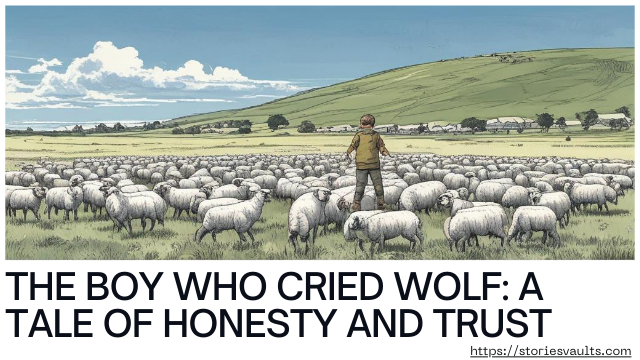Finn, a young shepherd lad, resided in a charming village situated at the base of a verdant hill at one time. Each day, he would lead the village’s flock of sheep up the hill to pasture in the meadows and maintain watch to ensure their safety, a task that was both straightforward and essential. It was a lonely position, but a tranquil one, and the villagers depended on him.
Finn relished the tranquilly of the hillside during the initial days. He would sit in the shade of a tall oak tree, observing the clouds as they drifted by and listening to the gentle noises of the sheep as they browsed. However, as the days passed, he began to feel restless. Finn’s imagination began to meander as he was left alone with no one to converse with, and a wicked notion began to form in his mind.
“I am curious as to what would transpire if I were to feign the presence of a wolf,” he speculated, his smile devious. The thought of the villagers rushing up the hill in a flurry of anxiety and concern struck him as humorous.
He leapt to his feet without hesitation, cupped his palms around his mouth, and shouted as loudly as he could, “Wolf! Wolf! There’s a predator pursuing the sheep!”
He observed the villagers ascending the hill in a matter of seconds, armed with clubs, pitchforks, and any other weapon they could locate to safeguard the livestock. They arrived breathless and frenzied, their features brimming with concern.
“What is its location?” One of the residents exclaimed, “Where is the wolf?”
Finn scarcely managed to contain his mirth as he pointed vaguely into the distance. “It must have run off when it heard you coming,” he said with a sneer.
The villagers, realizing they had been deceived, were none too delighted. “Finn, this isn’t a game,” said one of the elder villagers sternly. “We have enough to worry about without false alarms.”
Finn nodded and vowed he wouldn’t deceive again, though the memory of their frantic expressions still made him chuckle.
The next day, however, Finn found himself once again alone and restless. The memory of yesterday’s hoax tugged at him, and he couldn’t resist the impulse to attempt it again. After all, he reasoned, it was only an innocuous moment of amusement. So once more, he exclaimed, “Wolf! Wolf! The wolf is back!”
As anticipated, the villagers once again came surging up the hill. And, once again, they found no wolf. This time, their exasperation was palpable. “You’ve wasted our time again, Finn,” one of the villagers scolded. “If you keep lying, no one will believe you when there is real trouble.”
Finn brushed off their cautions with a grimace. He didn’t see the harm; to him, it was just a means to pass the time.
But later that afternoon, as the sun began to descend lower in the sky, Finn abruptly detected movement at the border of the meadow. A shadow slinked stealthily between the trees, low to the ground, and glinting eyes stared out from the underbrush. A wolf—this time, a genuine one—was prowling the livestock, preparing to attack.
Finn’s heart thumped as he vaulted to his feet. He shouted, louder than he ever had before, “Wolf! Wolf! Please, arrive soon! There’s a predator assaulting the sheep!”
But this time, no one came running up the hill. Finn bellowed and shouted until his voice grew raspy, but his petitions fell on deaf ears. The villagers had grown weary of his tactics and presumed he was merely attempting to deceive them once more.
Helplessly, Finn observed as the wolf attacked the flock, dispersing the panicked sheep across the meadow. By the time he had managed to drive it away, most of the livestock had either retreated or fallen prey to the predator.
As the sun began to set, Finn made his way back to the village with a sorrowful heart, herding the few remaining sheep. The villagers, startled to see him so late, congregated around. They noticed his tear-streaked visage and the missing livestock, and a solemn silence fell over the throng.
“Where are the rest of the flock, Finn?” one of the elders enquired quietly.
With weeping in his eyes, Finn acknowledged the truth. “There was a wolf… a real wolf this time. I called for assistance, but no one came. The predator dispersed the flock, and I couldn’t safeguard them on my own.”
An elderly man stepped forward and placed a tender hand on Finn’s shoulder. “When you lied before, you broke our trust,” he said compassionately but firmly. “Even when you needed us, we didn’t believe you, because we couldn’t tell the truth from the lie anymore.”
Finn nodded, comprehending now the gravity of his actions. He had learned a harsh but important lesson: lying, even as a jest, can have significant consequences. He swore from that day on to always be honest with the villagers and to never violate their trust again.
And so, Finn became known throughout the village as the most trustworthy shepherd they had ever known, never again compelled to cry wolf unless there truly was one.
Moral of the Story:
Lying breaks trust, and once broken, it can be hard to repair, even when honesty matters most.

